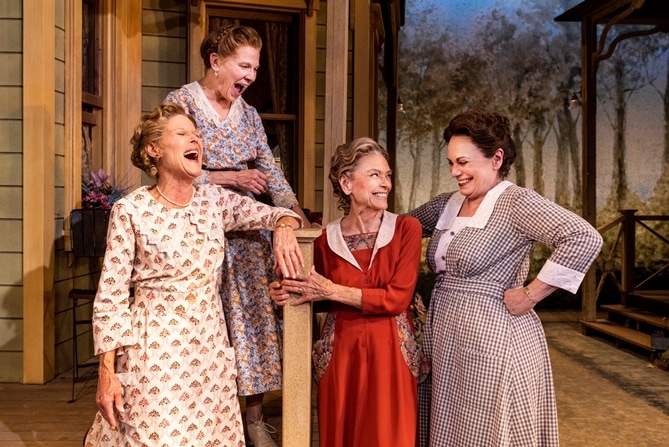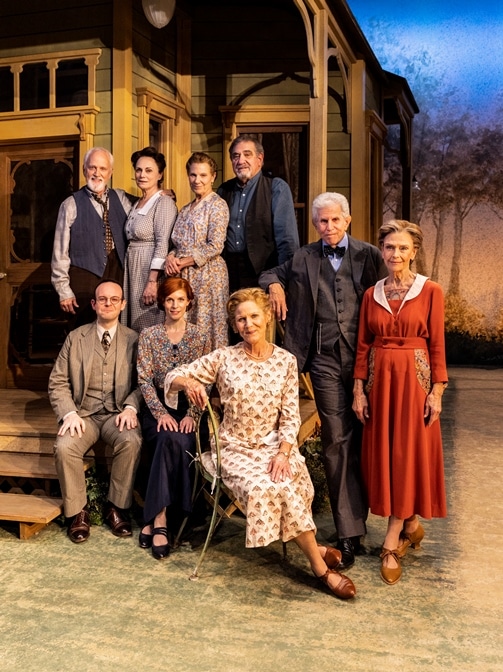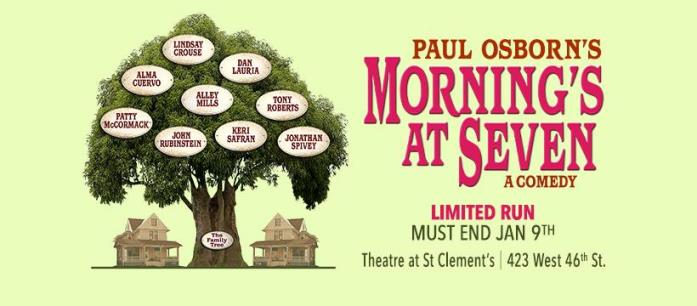It’s a regular day in the autumn of 1922, and the four aging Gibbs sisters – Cora, Ida, Arry, and Esther, now in their sixties and seventies – are living ordinary lives very near to each other in a small slow-paced Midwestern town where not much happens but gossip, delays, and avoidance of change. But as the afternoon progresses, the quirky siblings and their immediate families expose long-time rivalries, nagging disappointments, and long-held secrets in the charming Off-Broadway revival of Paul Osborn’s 1939 three-act comedy Morning’s at Seven, playing a limited engagement at the Theatre at St. Clement’s (the first NYC production of the show in 20 years, since its Tony-nominated run at Broadway’s Lyceum Theatre in 2002).

Dan Wackerman directs a stellar cast of seasoned veterans of the stage and screen who flawlessly deliver all the inherent humor and heart in this old-fashioned slice of Americana and uproarious send-up of the inter-relationships of an average American family. It’s a period piece that recalls the artistic sensibility of the iconic painter and illustrator Norman Rockwell and holds appeal for theatergoers of a certain age (the predominant audience at the performance I attended), as well as younger fans of classic works in the history of the American stage, while also offering a veritable master class in acting.
Set in the adjoining backyards of Cora and her husband Thor (with whom the unmarried Arry resides) and Ida and her husband Carl (whose adult son Homer still lives with them), the family is awaiting the arrival of Homer and his girlfriend Myrtle. Though the couple has been dating for twelve years, no one has ever met her, because the “shy” Homer “can’t be rushed into anything” – even with the house on the hill sitting empty for him to get married and the pair to move in.
When they arrive at last – as does Esther, whose condescending husband David has forbidden her to have contact with the other “morons” in her family – the long-anticipated introduction sets off a riotous chain of conversations, panic attacks, overnight disappearances, confrontations, and new living arrangements, as the characters face a metaphorical “fork in the road” and consider taking a different path and making some overdue changes in their lives, while they still have the time to enjoy a happy ending.
Lindsay Crouse and Alma Cuervo as the mature and straight-laced housewives Cora and Ida are the closest of the siblings, who share confidences with one another and often exclude the single and sometimes quarrelsome Arry, played with just the right amount of comic vehemence by Alley Mills. Patty McCormack as the agreeable Esther likes to spend time with her sisters, but to appease her controlling husband, can only sneak over for an occasional visit, until she gets caught and decides to stand up to him, with the united support of the other three.

The characterizations of the men are as compelling and entertaining as those of the women. In the role of Ida’s husband Carl, John Rubinstein captures his hyperbolic regret and embarrassment over the failure of his unsatisfying life (he just “wanted to be a dentist!”), while prone to emotional “spells” that leave him pressing his forehead against a tree and going in search of “the fork.” Tony Roberts is a howl as the insulting and dictatorial David, in contrast with Dan Lauria as the more amiably funny and accepting Thor, who, with good reason, serves as Arry’s defender.
And the outstanding portrayals of the elder generation are matched by those of Jonathan Spivey and Keri Safran as Homer and Myrtle. He is a neurotic bundle of indecision and excuses, unable at 40 to leave his mother’s home (hence the name “Homer”) or to make a full commitment to Myrtle. Her effusive and sidesplitting excitement over being introduced to his family – “the nicest people” she’s ever met – leaves them at a loss for how to respond to her incessant gushing. Each actor masterfully contributes to the consistently superb ensemble, which not only brings the laughs, but also the underlying insecurities that define the personalities and behavior of the characters.
Quentin Chiappetta’s soundscape of chirping crickets and popular music of the era, Barbara A. Bell’s vintage costumes, and Harry Feiner’s set with historicizing architecture and a woodsy painted backdrop capture the style of the decade, and lighting by James E. Lawlor III signals the progression from afternoon to evening to the bright new morning that reawakens everyone.
Along with the great performances and transporting design, the production is to be commended for its quaint (and very welcome) practice of actually starting the show on time – a rarity in our current age but very much in line with NYC theater in the good old days.
Running Time: Approximately two hours, including an intermission.
Morning’s at Seven plays through Sunday, December 5, 2021, at the Theatre at St. Clement’s, 423 West 46th Street, NYC. For tickets, starting at $44, go online. Proof of full COVID-19 vaccination and a photo ID must be shown upon entering the building, and masks covering the nose and mouth are required at all times.
To watch a montage of scenes from the show, click on the arrow below:





